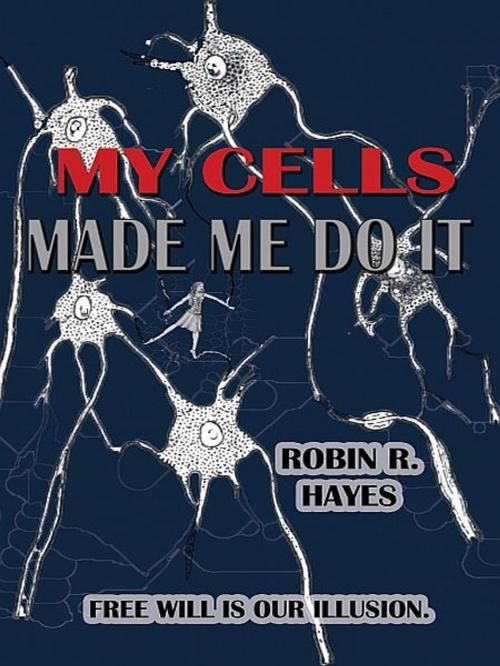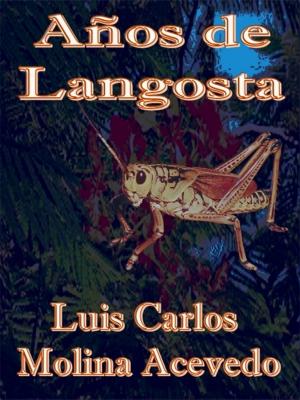| Author: | Robin R. Hayes | ISBN: | 9783960281665 |
| Publisher: | XinXii-GD Publishing | Publication: | December 1, 2015 |
| Imprint: | Language: | English |
| Author: | Robin R. Hayes |
| ISBN: | 9783960281665 |
| Publisher: | XinXii-GD Publishing |
| Publication: | December 1, 2015 |
| Imprint: | |
| Language: | English |
WHY DID I DO THAT? WHAT WAS I THINKING? FREE-WILL IS OUR ILLUSION.
Our behavior, the decisions we make and the actions we take, are nothing more than cellular responses. How our cells interpret their immediate environment dictates how we respond to our environment. Studies of behavior show that often we are unaware of why we make the decisions we do, and that these decisions can be easily manipulated and influenced by subtle environmental cues. What may seem like a free will decision may indeed not be so. MY CELLS MADE ME DO IT explains the phenomenon of behavior as a matter of cellular determinism.
Cells act individually in response to their immediate environment, modify this environment and we change the organism’s behavior. The behavior of the organism is determined by how its cells respond to the stimuli being received. Any notion then that our will is free is an illusion. Decisions we make are completely determined by how our cells respond, which in part is determined by experiences, perception, genetics. The book examines how environmental conditions influence cell behavior, how human behavior is a manifestation of cellular responses, and how this eliminates free-will decision making. Know enough about your cellular condition and you’ll have a better understanding of why you behave as you do.
Why do people do what they do? This wonderful book explains the science and shows why it matters. We are our cells and this book helps explain the diversity of the human experience by starting with the cell.-Paul J. Zak, author, The Moral Molecule.
"... Robin Hayes presents an empirically based argument for deterministically fated behaviors. Insightfully drawing upon discoveries in molecular biology, his compelling case merges biology and philosophy to a new level ..."-Erik Gergus, Ph.D. Biology, Glendale Community College.
"... demonstrates how and why our behaviors are inextricably determined by their biology and why freewill - or at least the illusion of free will - is necessary."-Terry D. Jones, Professor of Anatomy, California State University, Stanislaus.
Our behavior, the decisions we make and the actions we take, are nothing more than cellular responses. How our cells interpret their immediate environment dictates how we respond to our environment. Studies of behavior show that often we are unaware of why we make the decisions we do, and that these decisions can be easily manipulated and influenced by subtle environmental cues. What may seem like a free will decision may indeed not be so. MY CELLS MADE ME DO IT explains the phenomenon of behavior as a matter of cellular determinism.
Cells act individually in response to their immediate environment, modify this environment and we change the organism’s behavior. The behavior of the organism is determined by how its cells respond to the stimuli being received. Any notion then that our will is free is an illusion. Decisions we make are completely determined by how our cells respond, which in part is determined by experiences, perception, genetics. The book examines how environmental conditions influence cell behavior, how human behavior is a manifestation of cellular responses, and how this eliminates free-will decision making. Know enough about your cellular condition and you’ll have a better understanding of why you behave as you do.
Why do people do what they do? This wonderful book explains the science and shows why it matters. We are our cells and this book helps explain the diversity of the human experience by starting with the cell.-Paul J. Zak, author, The Moral Molecule.
"... Robin Hayes presents an empirically based argument for deterministically fated behaviors. Insightfully drawing upon discoveries in molecular biology, his compelling case merges biology and philosophy to a new level ..."-Erik Gergus, Ph.D. Biology, Glendale Community College.
"... demonstrates how and why our behaviors are inextricably determined by their biology and why freewill - or at least the illusion of free will - is necessary."-Terry D. Jones, Professor of Anatomy, California State University, Stanislaus.
WHY DID I DO THAT? WHAT WAS I THINKING? FREE-WILL IS OUR ILLUSION.
Our behavior, the decisions we make and the actions we take, are nothing more than cellular responses. How our cells interpret their immediate environment dictates how we respond to our environment. Studies of behavior show that often we are unaware of why we make the decisions we do, and that these decisions can be easily manipulated and influenced by subtle environmental cues. What may seem like a free will decision may indeed not be so. MY CELLS MADE ME DO IT explains the phenomenon of behavior as a matter of cellular determinism.
Cells act individually in response to their immediate environment, modify this environment and we change the organism’s behavior. The behavior of the organism is determined by how its cells respond to the stimuli being received. Any notion then that our will is free is an illusion. Decisions we make are completely determined by how our cells respond, which in part is determined by experiences, perception, genetics. The book examines how environmental conditions influence cell behavior, how human behavior is a manifestation of cellular responses, and how this eliminates free-will decision making. Know enough about your cellular condition and you’ll have a better understanding of why you behave as you do.
Why do people do what they do? This wonderful book explains the science and shows why it matters. We are our cells and this book helps explain the diversity of the human experience by starting with the cell.-Paul J. Zak, author, The Moral Molecule.
"... Robin Hayes presents an empirically based argument for deterministically fated behaviors. Insightfully drawing upon discoveries in molecular biology, his compelling case merges biology and philosophy to a new level ..."-Erik Gergus, Ph.D. Biology, Glendale Community College.
"... demonstrates how and why our behaviors are inextricably determined by their biology and why freewill - or at least the illusion of free will - is necessary."-Terry D. Jones, Professor of Anatomy, California State University, Stanislaus.
Our behavior, the decisions we make and the actions we take, are nothing more than cellular responses. How our cells interpret their immediate environment dictates how we respond to our environment. Studies of behavior show that often we are unaware of why we make the decisions we do, and that these decisions can be easily manipulated and influenced by subtle environmental cues. What may seem like a free will decision may indeed not be so. MY CELLS MADE ME DO IT explains the phenomenon of behavior as a matter of cellular determinism.
Cells act individually in response to their immediate environment, modify this environment and we change the organism’s behavior. The behavior of the organism is determined by how its cells respond to the stimuli being received. Any notion then that our will is free is an illusion. Decisions we make are completely determined by how our cells respond, which in part is determined by experiences, perception, genetics. The book examines how environmental conditions influence cell behavior, how human behavior is a manifestation of cellular responses, and how this eliminates free-will decision making. Know enough about your cellular condition and you’ll have a better understanding of why you behave as you do.
Why do people do what they do? This wonderful book explains the science and shows why it matters. We are our cells and this book helps explain the diversity of the human experience by starting with the cell.-Paul J. Zak, author, The Moral Molecule.
"... Robin Hayes presents an empirically based argument for deterministically fated behaviors. Insightfully drawing upon discoveries in molecular biology, his compelling case merges biology and philosophy to a new level ..."-Erik Gergus, Ph.D. Biology, Glendale Community College.
"... demonstrates how and why our behaviors are inextricably determined by their biology and why freewill - or at least the illusion of free will - is necessary."-Terry D. Jones, Professor of Anatomy, California State University, Stanislaus.















